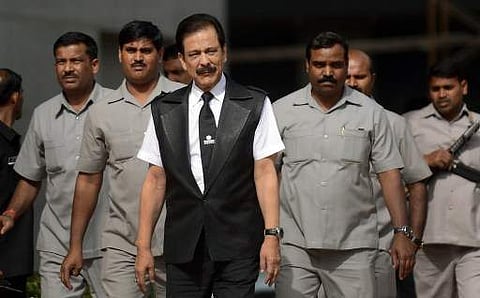

The passing away of Subrata Roy, founder and chairman of the Sahara India Pariwar, today marks the end of one man's remarkable journey from rags to riches, full of intrigue and drama.
Born in 1948 in Araria, Bihar to Sudhir Chandra Roy, a locomotive driver, and Chhabi Roy, a housewife, Subrata grew up in a humble household. After completing his schooling in Gorakhpur, he did a diploma course in mechanical engineering and worked briefly at a company in Kolkata.
However, he always dreamt big and wanted to start his own business. In 1978, a providential meeting with a group of bankers gave Subrata the seed capital of Rs 2000 to start Sahara Finance in Gorakhpur. The first office was housed in a tiny room. The company initially collected small deposits from the poor and local small businessmen.
Through an aggressive grassroots network across small towns and rural India, Sahara Finance grew rapidly as people trusted the Sahara brand. By the mid-1980s, Subrata set up shop in Lucknow, which would serve as the corporate headquarters of his future empire. In 1987, he established Sahara India Pariwar as the parent entity with diversified interests in finance, housing, media and entertainment, manufacturing, sports etc.
Over the next two decades, Subrata catapulted Sahara from a regional player to a pan-India empire with assets over US$11 billion and an investor base of nearly 30 million. He forayed into cricket by sponsoring the Indian national team. Subrata also owned a 42.5% stake in Formula One's Force India team.
In 2004, Sahara launched Sahara One, a Hindi general entertainment TV channel. The group also owned several news channels and newspapers in different languages. Subrata's business interests extended overseas with hotels in London, New York and partnerships in the Middle East. He owned several luxury homes across Europe including Grosvenor House in London.
Roy was also in the headlines for the opulent wedding of his sons in 2004 which cost a reported Rs 550 crores.
Despite running a professionally managed conglomerate, Subrata always promoted a familial culture where employees referred to him endearingly as "Saharasri". He projected a benevolent image through philanthropic activities such as sponsoring the Indian hockey team and various social causes. Subrata received an honorary doctorate from the Lalit Narayan Mithila University.
However, trouble was brewing underneath. In 2010, Sahara was accused of violating norms by raising money from two unlisted group firms. After a long legal battle, the Supreme Court ordered Sahara in 2012 to refund Rs. 24,000 crores collected from investors through OFCDs (optionally fully convertible debentures) along with 15% interest for violating norms.
As the group failed to convince the court regarding the source of funds, Subrata was sent to Delhi's Tihar Jail in 2014 for not complying with refund orders. He spent over 2 years in prison under judicial custody along with being hospitalized several times for chronic illnesses.
In 2016, Subrata was granted interim bail to attend his mother's funeral. Eventually, he was granted bail but was barred from leaving the country and asked to report to a police station weekly.
Meanwhile, SEBI confiscated Sahara's prized properties like New York's Plaza Hotel, Grosvenor House and Aamby Valley resort to recover dues.
In 2018, the Supreme Court directed Subrata to pay the remaining Rs. 9,000 crores to SEBI so that Sahara's properties could be released from attachment. However, the group claimed it repaid most investors in cash and opposed SEBI's valuation of properties.
Subrata transformed Sahara from a tiny firm to an empire but his fall from grace was equally dramatic. The intense legal battle and his jail time tarnished the image of the man who once epitomized an aspirational rags-to-riches story.